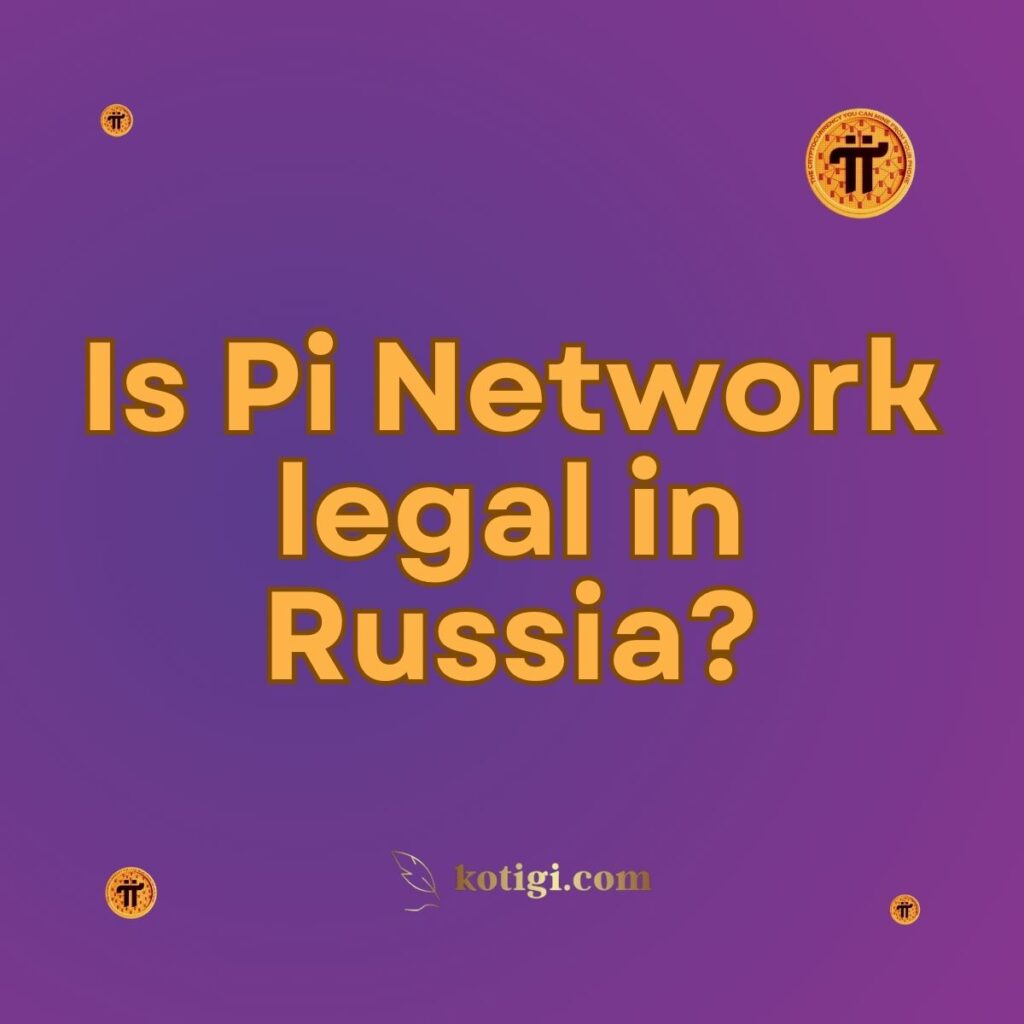
Is Pi Network legal in Russia?
Pi Network is not officially banned in Russia, and there are currently no specific regulations that directly address the legality of using or mining Pi. However, Russia’s broader stance on cryptocurrencies, combined with ongoing regulatory developments, makes the legal status of Pi Network uncertain. Users in Russia should be aware of evolving laws around digital currencies and take appropriate caution while participating in the Pi Network.
Introduction
As the global user base of Pi Network continues to grow, one of the major questions that arises is whether Pi Network is legal in various countries, including Russia. Russia’s regulatory environment for cryptocurrencies has been evolving over the years, and while the country has not outright banned the use of digital currencies, it has placed restrictions on certain aspects of their use. In this article, we will examine Pi Network’s legal standing in Russia and discuss how existing cryptocurrency laws might apply to the network and its users.
1. Russia’s General Stance on Cryptocurrencies
Russia has taken a cautious approach when it comes to regulating cryptocurrencies, which affects the legal standing of Pi Network as well.
1.1 Legal Framework for Cryptocurrencies
In 2020, Russia introduced the “On Digital Financial Assets” law, which formally recognized cryptocurrencies as digital assets but prohibited their use as a form of payment. This law sets the foundation for how digital currencies are treated in Russia and could influence how Pi Network operates within the country.
1.2 Restrictions on Crypto Transactions
While Russia allows its citizens to own and mine cryptocurrencies, using them for transactions is restricted. Pi, which operates on a peer-to-peer basis with future intentions of being used for transactions, may face limitations under this framework.
1.3 Government’s View on Crypto Mining
Mining cryptocurrencies is not explicitly banned in Russia, and Pi Network’s mobile mining model does not require energy-intensive equipment, which may provide it with some regulatory leeway. However, users should be cautious about changes in legislation that could affect mining activities.
2. The Unclear Status of Pi Network in Russia
Pi Network exists in a somewhat gray area in Russia, as it is not explicitly regulated under current cryptocurrency laws.
2.1 Lack of Specific Legislation on Pi Network
There are currently no specific laws in Russia that regulate the use of Pi Network. As the network continues to develop, it remains unclear how Russian authorities might categorize Pi in relation to other cryptocurrencies.
2.2 Concerns about Future Regulation
Russia has hinted at implementing stricter cryptocurrency regulations in the future. This could affect Pi Network if authorities decide to extend crypto-specific rules to cover new forms of decentralized networks like Pi.
2.3 Regulatory Risks for Users
While using Pi Network is not illegal in Russia, users should be mindful of the potential risks involved if the legal framework shifts. Engaging in Pi Network’s activities, such as mining and future transactions, could be impacted by changes in the country’s legal landscape.
3. Potential Legal Issues for Pi Network Users in Russia
While Pi Network itself is not illegal, users in Russia should consider several potential legal challenges that may arise.
3.1 Restrictions on Use for Transactions
As mentioned, Russian law prohibits the use of cryptocurrencies for payments. Once Pi becomes tradable or exchangeable for goods and services, this restriction could apply to Pi Network, making it illegal for users to transact with Pi.
3.2 Taxation Concerns
Russia requires its citizens to report their cryptocurrency earnings for tax purposes. While Pi is not currently listed on exchanges, users should be prepared for future tax obligations once it gains monetary value. Failing to report income derived from Pi could result in legal consequences.
3.3 Data Privacy and Security Laws
Russia has strict data privacy laws, and users engaging with Pi Network’s app should be aware of how their data is being collected and used. Compliance with Russia’s data protection laws, such as the Federal Law on Personal Data, will be important for Pi’s operations in the country.
4. Potential Future Developments in Russian Crypto Law
Russia’s legal landscape for cryptocurrencies is still evolving, which means that Pi Network’s legal status could change in the near future.
4.1 Future Crypto Legislation
Russian lawmakers are continuing to draft and propose new laws aimed at regulating the cryptocurrency space. Depending on the direction of these regulations, Pi Network could either face stricter rules or benefit from clearer guidelines on its use.
4.2 Potential for Crypto Legalization
Some experts believe that Russia might eventually legalize certain uses of cryptocurrencies as digital assets, which could provide a more favorable legal environment for Pi Network. This would make it easier for Pi to be used within Russia’s economic system, but such developments are still uncertain.
4.3 Impact of International Sanctions
Russia’s ongoing political issues and international sanctions could impact how cryptocurrency networks, including Pi, operate within the country. If more stringent financial controls are introduced, they may extend to digital currencies and networks like Pi.
5. Pi Network’s Compliance with International Regulations
Pi Network’s global reach means it must consider the legal requirements of various jurisdictions, including Russia.
5.1 Pi’s Global Regulatory Strategy
Pi Network has stated its intention to comply with local laws in all countries where it operates. This includes adhering to any future crypto regulations that Russia might impose. The network’s global strategy aims to strike a balance between decentralization and regulatory compliance.
5.2 Pi’s Approach to User Verification
Pi Network’s KYC (Know Your Customer) process, which aims to verify user identities, helps to ensure compliance with local laws, including anti-money laundering (AML) requirements. This process could become particularly important if Russia enforces stricter cryptocurrency regulations.
5.3 Collaboration with Regulators
As the network grows, Pi Network may engage with Russian authorities to ensure that it operates within the country’s legal framework. This could involve working with local regulators to clarify Pi’s status and ensure compliance with Russian law.
6. What Should Pi Users in Russia Do?
While Pi Network is currently legal in Russia, users should take certain precautions to ensure they remain compliant with the law.
6.1 Stay Informed About Regulatory Changes
It is essential for Pi users in Russia to stay updated on any new laws or regulations related to cryptocurrencies. Changes in the legal landscape could affect how users are allowed to participate in the Pi ecosystem.
6.2 Report Earnings and Comply with Tax Laws
Russian users should be prepared to report any income they earn from Pi Network once it is tradable. Properly declaring earnings can help users avoid penalties or legal issues in the future.
6.3 Be Cautious with Transactions
Until Pi Network becomes fully regulated in Russia, users should avoid using Pi for illegal transactions, such as using it as a payment method where it is prohibited. Exercising caution can help users avoid running afoul of Russian law.
Conclusion
While Pi Network is not currently illegal in Russia, its legal status remains uncertain as the country’s cryptocurrency regulations continue to evolve. For now, Russian users can engage with Pi Network without legal restrictions, but they should be prepared for potential changes in the regulatory environment. It is important for users to stay informed about new developments, comply with tax and data protection laws, and avoid using Pi for restricted transactions. By doing so, Pi Network’s Russian community can continue participating in the platform while mitigating potential legal risks.
Key Takeaways
- Pi Network is not banned in Russia, but the country’s laws prohibit the use of cryptocurrencies for payments.
- Russian users can mine and own Pi, but should be aware of potential future changes in the regulatory environment.
- Users should comply with tax reporting requirements once Pi has a monetary value.
- Data privacy laws and transaction restrictions may impact Pi Network’s operations in Russia.
- Staying informed about regulatory changes is crucial for Russian users to ensure they remain compliant with the law.





